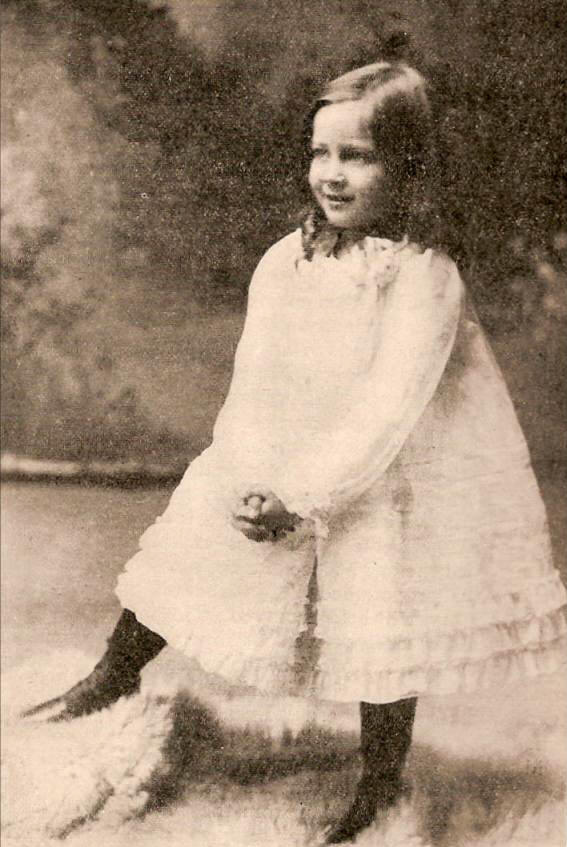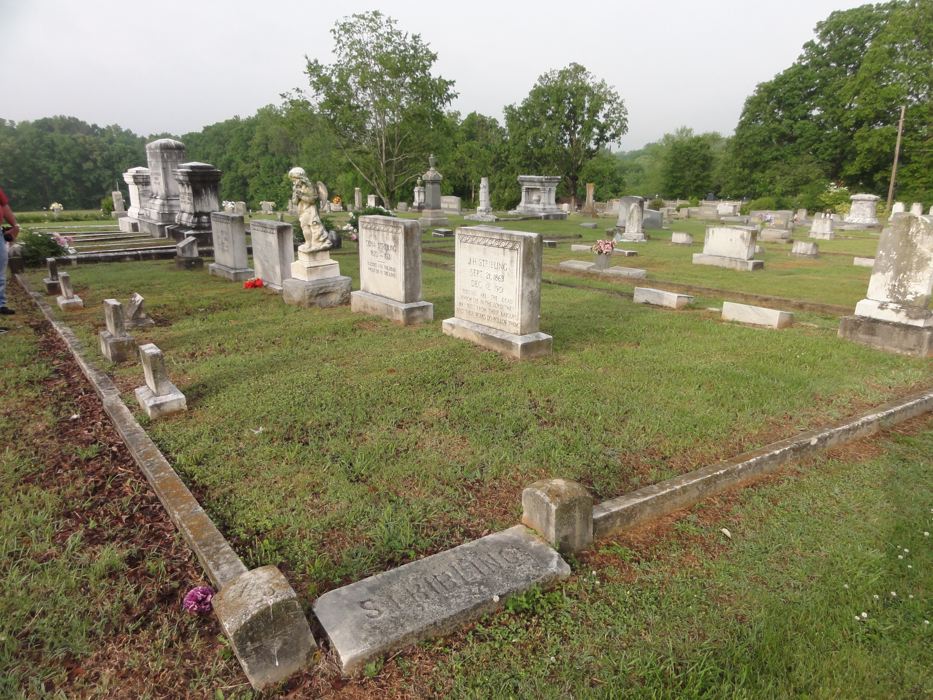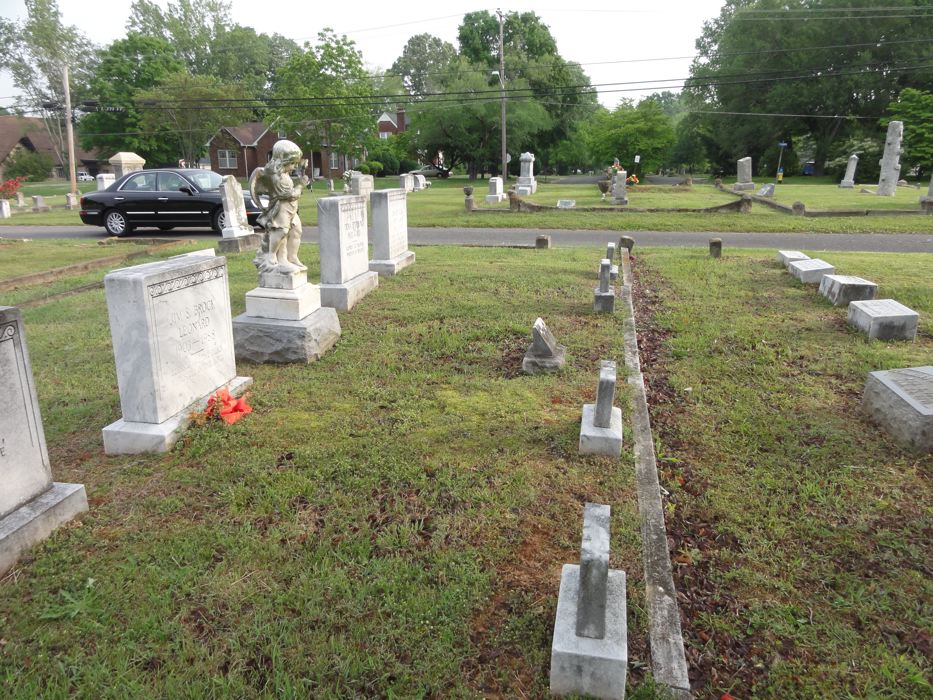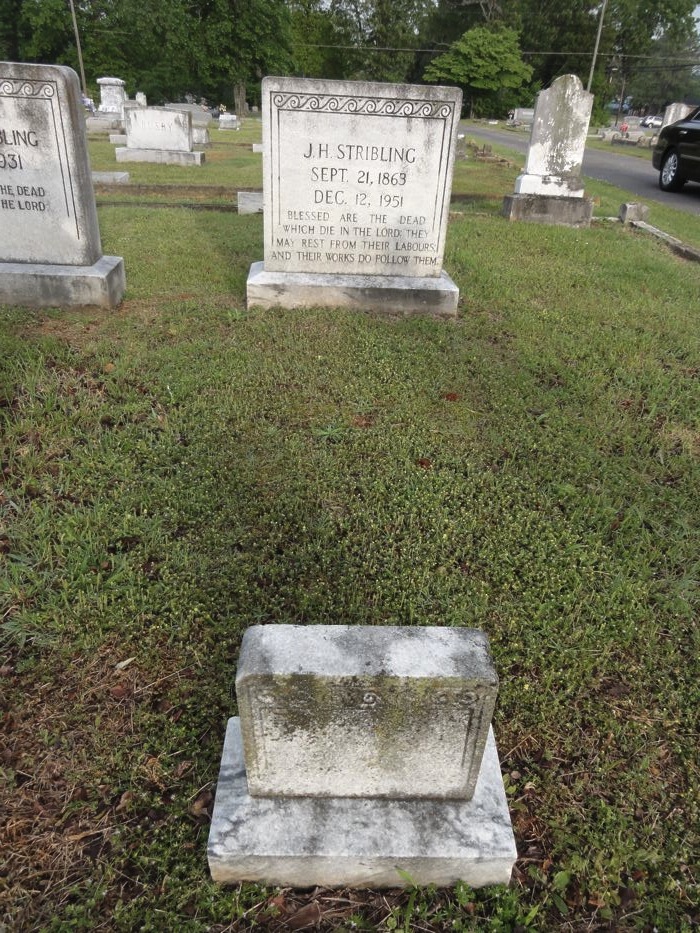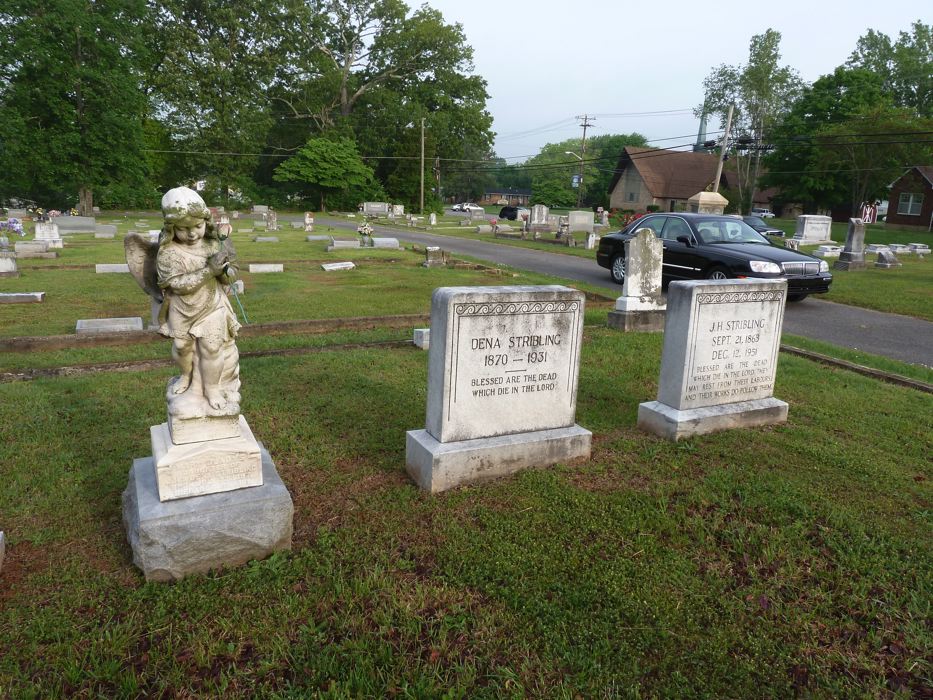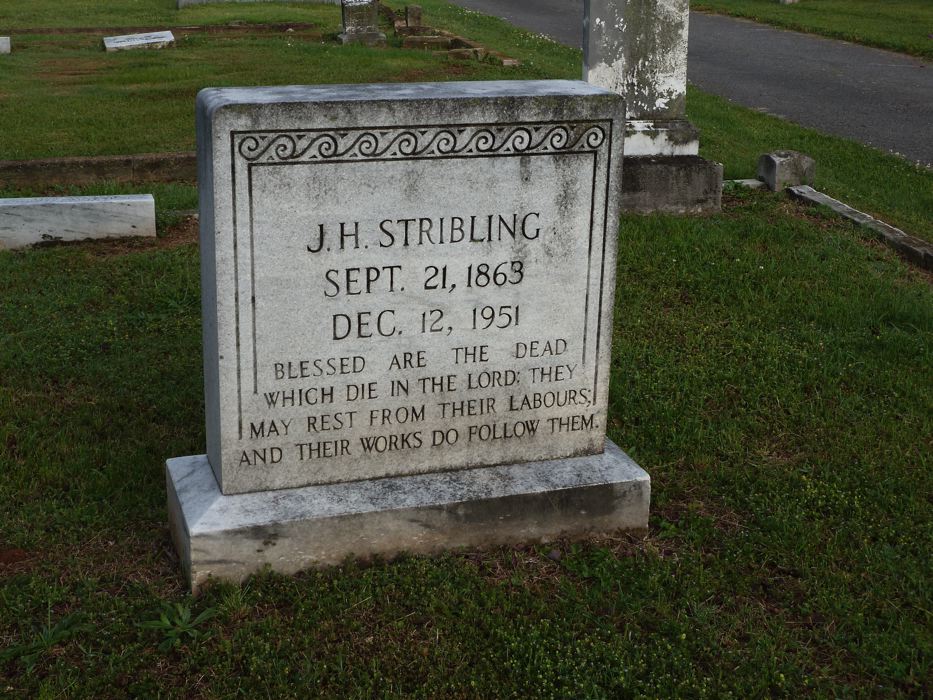James Henry Stribling
1863 - 1951
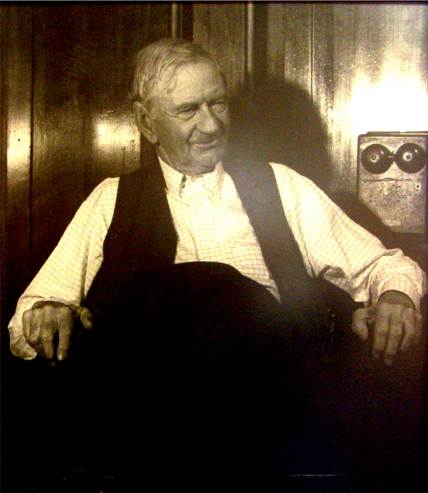
Entrepreneur, Bank President, Financier, And Church Leader Around Lawrenceburg, Tennessee
J. H. Stribling was a church leader in and around Lawrenceburg, Tennessee. He was an entrepreneur and financier of many works among churches of Christ. He helped to underwrite the works of men like J. T. Harris, R. H. Boll and E. O. Coffman as they evangelized in the south central Tennessee region.
The story of his conversion began with the tragic loss of his oldest child, Gladys. This is a beautiful example of how God can take the worst of situations and bring something good as a result. Read further about Gladys and the events that brought her parents to Christ.
Stribling's wealth and influence was felt greatly his community. He financed the building of the Salem church building just west of Lawrenceburg. He also financed the building of at least two children's homes as well.
In the Restoration Movement, names such as Emily Tubman and A. M. Burton are easily recognized as benefactors of great efforts and works. However, the name J. H. Stribling should be added to the list as being a man who did great things for the cause of Christ in South Central Tennessee.
See some of the Stribling contributions here!
![]()
James H. Stribling
It is not an "obituary" I am writing, but rather a brief life-sketch in remembrance and honor of one lately passed away—as I knew him, and knew of him—a great man and noble, whom it was my privilege to know during the latter half of his long life. I met him first in his home town, Lawrenceburg, Tennessee. This was his birthplace, and there, a bare-foot boy, he spent his early years of privation and poverty; and to this town he also returned in the prime of manhood, after he had made the beginning of his ultimately vast fortune.
It was by his request that I came to Lawrenceburg in 1910. He had himself built a magnificent high-school building; and his plan was to give his town and county free use of it: reserving only one room in which the Bible should be taught every day to any and all who might choose to avail themselves of the opportunity thus given. This plan and purpose was carried out for many years according to the generous provision of Brother Stribling.
But back of all this enterprise lay a tale of mortal grief and of faith and hope and love; the story of which I will try to relate, and as nearly as I can in the way in which he himself told it to me.
J. H. Stribling was a man of such power and ability, that, had he been in public place he would have ranked among the most notable men of his generation. For executive ability, for wisdom and foresight and business acumen, and for force of character he had no equals. After having spent some years in the state of Texas, he settled down in Lawrenceburg for life. He was amazingly prosperous. In everything he undertook he was successful. His wealth grew from year to year. In all his dealings and transactions he was ruggedly honest and upright. He became more and more prominent—a successful, prosperous man of the world. And at that time his thoughts went no higher than that. He had one child. All the love he was capable of centered upon that little one. One night—it was near Christmas—the little girl, then about 4 years old, cried out during the night. The father rose up. and walked the floor with her; when suddenly she gave a gasp and died in his arms. "I can't tell you how I felt," he said. "Wife and I were simply crazy with sorrow."
After the funeral I said to her. 'Let's go away from here.' So we took the train and traveled, north, south, east, west, anywhere, aimlessly hither and thither, hoping in some measure to forget our grief. But nothing helped. We landed in Dallas. My wife said, 'I would like to go up to Denton County where my folks live.' 'Go.' 'I said, 'and I'll go back home, and will be waiting for you.' After my return, I was like a man in a daze. I took notice of nothing—had no interest in anything. Along in March the men were clearing ground on my farm, and burning brush at the foot of a dead tree, and I watched the flames shooting up through the hollow tree, high into the air. That as I remember was the first thing that arrested my attention, and gave me a little pleasure. When gradually I collected my reason, in the weeks that followed, one thought took possession of me: If there is any hereafter (and I believed there was) I must see my little girl again. But I knew that being such as I was I could never go where that pure innocent child has gone. I made up my mind to find salvation.—"Brother Boll," he said to me, "there is not a secret place on this farm (his farm was then about 9,000 acres—much larger later)—where I haven't knelt and called on God for Christ's sake to save my poor soul. But I found no hope nor relief."
One day my friend, W. R. King, an attorney in Lawrenceburg said to me, 'Stribling, there's a man preaching in town, and I think you would like to hear him. His name is T. B. Larimore.' So I went with him." On that night Brother Larimore preached a simple sermon on "What Must I Do to Be Saved?" and made it very plain; and at the close he said, "Whosoever will, let him come." Stribling jumped up and said "I will'; made the good confession, and was forthwith baptized. From that day on he and all he had belonged to the Lord Jesus Christ.
God gave him another child—another little girl, so much like the one he lost as to seem as if God were giving him back what he had lost. This little one he loved almost insanely, and with daily, hourly anxious concern for its health. "When I am out on the farm," he said to his wife, "if anything in the least should be wrong with the child, call me any hour of day or night, and I'm coming." His anxiety for the child alarmed some of Brother Stribling's friends, who feared that if anything should happen to her he might turn away from the Lord. So they asked Brother Larimore to write to him about it. The letter Brother Larimore wrote ran something as follows:
"Dear Brother Stribling:
"Your friends and all the church rejoice in your new-found faith and love. But they have a misgiving. They know how great is your lose and your concern over the welfare of your little one, and they are afraid that if the Lord should see good in His wisdom to take this child also, that you might lose your faith. And they asked me to write you about this . . . ."
To which Brother Stribling replied:
"Dear Brother Larimore:
"I thank you for your letter and the concern you and the brethren feel for me. If this child should die, I don't know what I would do or how I could bear it. But on this point you can rest assured—whatever may come or go, I belong to the Lord Jesus Christ, now and henceforth and forever.
Your brother in the Lord,
J. H. Stribling."
When the high-school building was completed I was the first teacher in the Bible Room. That was the session of 1910-11. I taught whoever would come—classes all day, every school-day. On Monday nights I preached to the colored people in town. On Friday nights I gave a Bible lecture at the court-house. Sundays I preached part of the time for the church at Lawrenceburg, part of the time at Mars Hill (Brother Larimore's old home and home church) and other Sundays at Sheffield, Ala. It was an over full program, and I was fagged out when spring came. Then, just about school-close, an epidemic arose, and within one week my child was taken away—little girl about 2 years old. Among the things I could never forget was the loving sympathy of Brother Stribling toward me in my bereavement. "Brother Boll," he said, "I want you to bury your baby in my lot, where my child is buried." So there has been her little grave ever since. The inscription on the marker reads "Madeline Boll" Born June 24, 1909 "Died May 28, 1911" "Leaving us both richer and poorer."
But I could stay at Lawrenceburg no longer. I had preached at Portland Avenue in Louisville from January, 1904, to the time I took up the work at Lawrenceburg. During my 10 months' absence they had got no one else to preach there regularly. They wanted me to come back, and I wanted to go back; and since then have remained with the Portland Church. Brother J. E. Thornberry took up the Bible work at the Lawrenceburg High school, and did it for many years afterward. Frequently, I have gone back to Lawrenceburg since both to preach and to visit the little grave.
Of the rest of Brother Stribling's work—how and why the Bible-class work was at last discontinued, and the building sold to the county; and of the Orphanage Brother Stribling started on his place, its many buildings and provisions, and the church-house he built on the grounds, and the 22,000 acres of land he deeded to the orphanage—of that let someone else write. I admired Brother Stribling for his wonderful ability and wisdom, his qualities of head and heart. I used to marvel how perfectly he had all his work in hand: getting calls from all parts of his farm, from his sawmills, from his bank (The First National of L. )—asking for orders, demanding counsel and instant, sometimes very difficult decisions, which he never failed to give on a moment's notice. But greater than all his abilities was his unwavering righteousness and devotion to his God, and his love toward all men.
Once, when I held a short meeting for the church at Lawrenceburg he had me to hold daily services at his bank, at the opening hour—on his time. "You surely must be conducting your bank-business on a high level" I remarked to him one day, "or you couldn't be having religious meetings in your bank with your employees." "Why, Brother Boll," he answered, "I wouldn't be in any business in which I couldn't have the Lord Jesus Christ as my Partner. During all this depression, nor at any other time, did we ever foreclose on anybody." Some may wonder and ask, "How could he run a bank on such principles?" Well he did, and suffered no great loss by it. On Lord's day he taught the Bible, made talks, waited on the table; and on all days he served the Lord.
Now he has fallen asleep in Jesus. It was a long and busy life. He met all its problems and trials by faith in his Lord. He lived to the glory of God, and his works follow him.
-Word and Work, January 1952 (contributed by Larry Miles - 08.12.2015)
![]()
MRS. J. H. STRIBLING
Very unexpectedly Sister Stribling, beloved wife of J. H. Stribling of Lawrenceburg, Tenn., slipped away on the night of June 24, and now she sleeps in the peaceful little cemetery on the hill, by the side of her little daughter who years before had died the same way; the while her spirit awaits the coming of our Lord Jesus Christ, among whose people her name also was one of those that was written. (In a corner of the same lot a little removed sleeps also my little daughter to whom Brother and Sister Stribling, in unforgettable kindness, once gave a room and resting place along with their own.)
The funeral was by Sister Stribling's own request a very quiet little meeting, hardly to be called a funeral, with no announcement and no ado. On the evening following Sister Stribling's death, a few friends met with the sorrowing family, and Brother T. C. King aid a few words in his good, loving simple way; and the earthly remains of the wife and mother of Brother Stribling's home was quietly laid to rest. Peace be to her resting place, and peace to the bereaved hearts. of her loved ones, the while we wait for the light of the morning, when we· shall meet again our own, whom "we have loved long since and lost a while.” · R. H. Boll
-Word And Work, October 1931
Contributed by Larry Miles, 04.24.2020
![]()
Location Of The Grave Of J. H. Stribling
The Stribling burial plot is located in the Mimosa Cemetery, Lawrence County, Tennessee. Going into Lawrenceburg from Florence, Alabama on Hwy 43, turn east on Hwy 64 toward Pulaski. Go about 1/4 mile and the cemetery is on the right.In the Stribling plot is also buried the oldest child of R.H. Boll, a preacher who lived and taught in the area around 1910.Enter the main gate of the cemetery
on south side of Hwy. 64 and go to the first road and turn right. Then go
down five or six rows and look to the left for the Stribling plot.
While in the cemetery be sure to visit
the graves of W.F. Wall, James T. Harris and Charles E. Holt. Also J.D. Vaughn, owner of Southern
Gospel Singing and Publishing Co. that has produced many church songs.
GPS Location
35°14'20.5"N 87°19'15.7"W
or D.d. 35.239021,-87.321036
![]()
Daughter of R.H. Boll who died while he was worked in Lawrenceburg,
buried in the Stribling Plot at Mimosa Cemetery
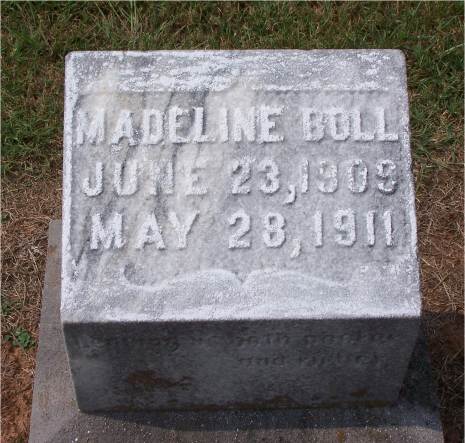
Madeline Wilhelmina Boll
June 23, 1909
May 28, 1911
![]()
Little Gladys Stribling
Emma Page Larimore, in her book entitled, Letters And Sermons Of T.B. Larimore, wrote about Brother Larimore's love for children. In their travels they met so many families and touched so many lives. It always burdened the heart of T.B. Larimore when a family felt the sadness of a lost child. She writes as follows:
Loving and appreciating children as he does, he has a very tender sympathy for those whose hearts and homes have been shadowed by the loss of a child. Enclosing pictures of three little sisters, Margaret, Maurine and Stella Johnson, he wrote:
"These little darlings are 'lambs of the upper fold' now. They were the only children of the household, and the three died and were buried within one week. Oh! well, they missed all the sorrows of earth and gained all the joys of Heaven by going home."
The picture of a little girl instinct with childish grace and beauty is inscribed: "Little Gladys Stribling. Born July 22, 1897. Went home December 31, 1901. The only child of James H. Stribling and wife, of Lawrenceburg. Tenn., who are heartbroken because of her departure. Her father has this picture, enlarged and beautifully framed, hanging over the vault in his bank." Of the same beautiful child, a friend writes: "'With her little hands she has linked Heaven and earth closer together for her father and mother. Soon after Gladys' death, God, in his wise providence, caused Brother Larimore to be called to our town, to speak the word of God. He heard of their sorrow, and, with kind, sympathizing words, won their respect and interest. Through his preaching, Brother Stribling was persuaded to obey the gospel and unite himself to the band of Christians worshiping at this place. Brother Larimore's words of consolation and his constant reference to Him who says, 'Come unto me, all ye that labor and are heavy laden, and I will give you rest, have taught the sorrowing father and mother to bear their loss with Christian fortitude."
That sorrowful household is now gladdened by the presence of a baby daughter- "Little Jim" -but Gladys' place in the hearts of her father and mother can never be filled.
-Life, Letters & Sermons Of T.B. Larimore, by Emma Page, pages 322,323
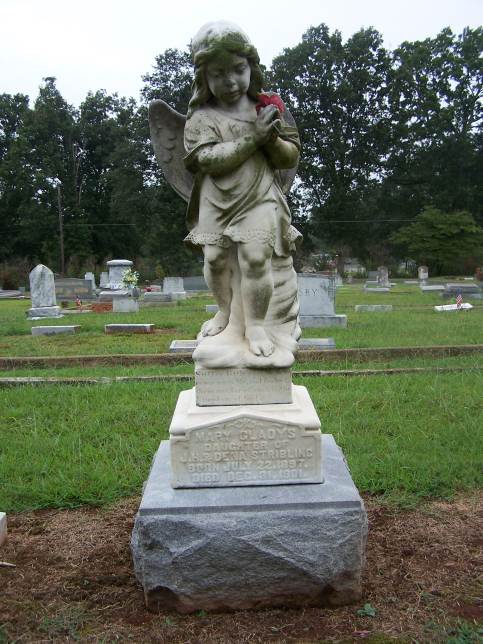
Suffer little children to
come unto Me, and forbid
them not, for of such is the
Kingdom of God.
Mary Gladys
Daughter Of
J. H. & Dena Stribling
Born July 22, 1897
Died Dec. 31, 1901
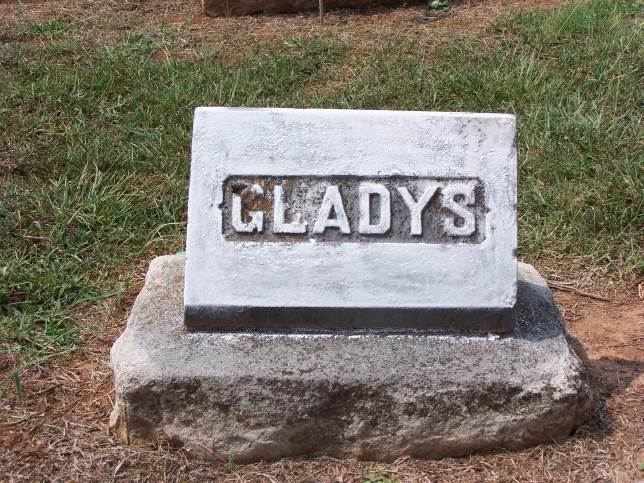
Little Gladys Stribling's Footstone
![]()
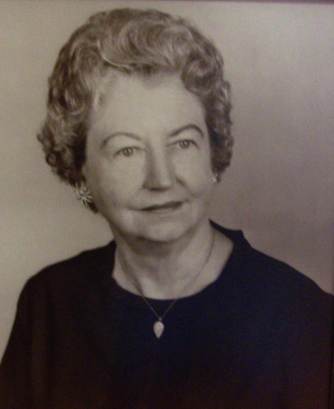
"Little Jim" Stribling Brock Leonard
Bank President - Daughter Of J. H. Stribling
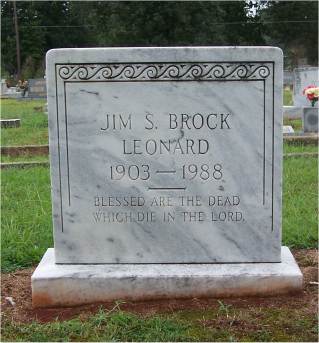
Jim S. Brock
Leonard
1903-1988
Blessed Are The Dead
Which Die In The Lord
(Daughter of J. H. Stribling)
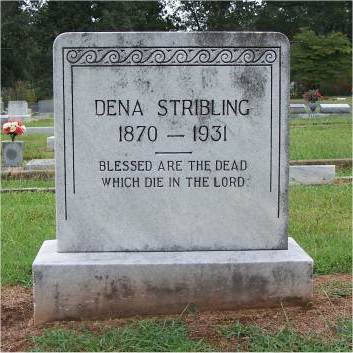
DENA STRIBLING
1870-1931
Blessed Are The Dead
Which Die In The Lord
wife of J. H. Stribling
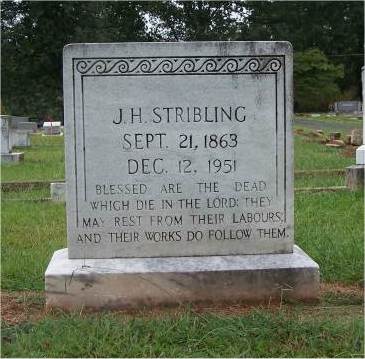
J. H.
STRIBLING
Sept. 21, 1863
Dec. 12, 1951
Blessed Are The Dead
Which Die In The Lord; They
May Rest From Their Labors
And Their Works Do Follow Them
![]()
New Photos Recently Added
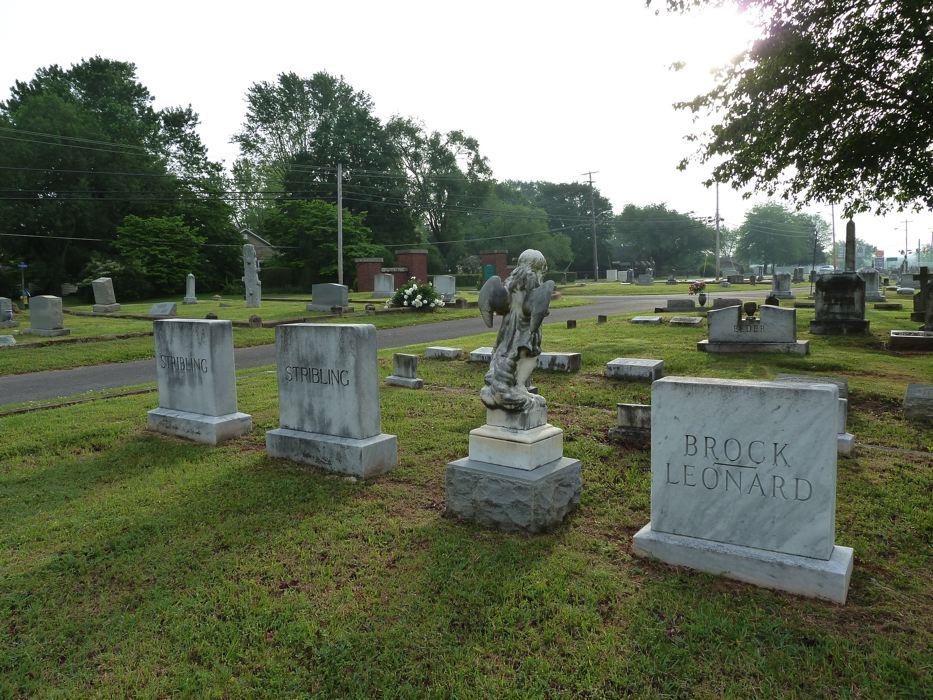
![]()
Note Of Thanks: Thanks to Wayne Kilpatrick for providing information and photos for this page.
![]()
